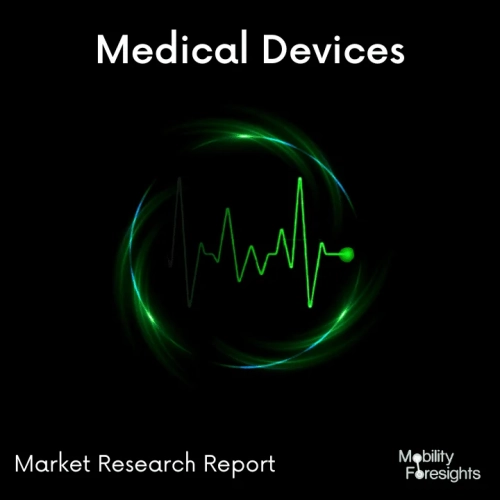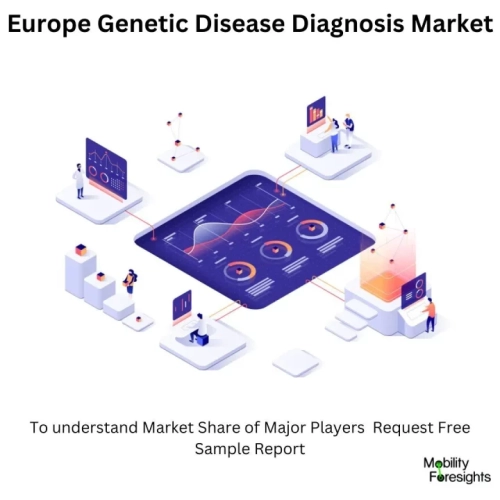
- Get in Touch with Us

Last Updated: Apr 26, 2025 | Study Period:
The Europe Genetic Disease Diagnosis Market is experiencing significant expansion, driven by advancements in technology and a growing awareness of genetic disorders. With a diverse population and a high prevalence of hereditary diseases, including cystic fibrosis, Huntington's disease, and various cancers, the need for effective genetic testing solutions is increasingly recognized across the region.
Technological innovations, particularly in next-generation sequencing (NGS), polymerase chain reaction (PCR), and microarray analysis, are transforming the landscape of genetic diagnostics. These advancements enable faster, more accurate testing, allowing healthcare providers to conduct comprehensive genomic analyses that facilitate early detection and personalized treatment strategies.
Government initiatives play a critical role in promoting genetic testing within public health systems. Many European countries are integrating genetic diagnostics into their healthcare policies, particularly for high-prevalence disorders. This support enhances access to genetic services, particularly in underserved areas. Increased public awareness of genetic disorders is another driving factor. Educational campaigns are informing individuals about the importance of genetic testing for early diagnosis and management, leading to greater acceptance and utilization of these services. The market is characterized by a diverse array of stakeholders, including biotechnology companies, diagnostic laboratories, and research institutions, all working to advance genetic testing capabilities. While the market outlook is positive, challenges such as high testing costs, regulatory complexities, and ethical considerations surrounding genetic data remain prominent.
The Europe Genetic Disease Diagnosis Market is poised for substantial growth, with a focus on technological advancements, government support, and personalized healthcare strategies aimed at improving patient outcomes.
The Europe Genetic Disease Diagnosis Market is rapidly evolving, driven by increasing awareness of genetic disorders and significant advancements in diagnostic technologies. With a diverse population facing a high prevalence of hereditary conditions such as cystic fibrosis, sickle cell disease, and various cancers, there is a growing need for accurate and efficient genetic testing solutions across the region.
Technological innovations, particularly in next-generation sequencing (NGS), polymerase chain reaction (PCR), and microarray technologies, are revolutionizing genetic diagnostics. These tools enhance the precision and speed of testing, allowing healthcare providers to conduct comprehensive genomic analyses that facilitate early detection and personalized treatment plans.

Government initiatives are playing a vital role in promoting genetic testing as part of public health strategies. Many European countries are integrating genetic diagnostics into their healthcare systems, focusing on high-prevalence disorders and improving access to these essential services. This regulatory support is crucial for expanding the reach of genetic testing, especially in underserved populations. Public awareness about the significance of genetic testing is also on the rise. Educational campaigns are informing individuals about the benefits of early diagnosis and preventive healthcare, leading to greater acceptance and utilization of genetic services.
The market is characterized by a diverse array of stakeholders, including biotechnology firms, diagnostic laboratories, and research institutions, all contributing to the growth and innovation in genetic testing. Overall, the Europe Genetic Disease Diagnosis Market is poised for substantial growth, emphasizing technological advancements and a commitment to personalized healthcare aimed at improving patient outcomes.
The Europe Genetic Disease Diagnosis Market is characterized by several key trends that are shaping its future.
The market is witnessing rapid growth due to innovations in genetic testing technologies, particularly next-generation sequencing (NGS) and polymerase chain reaction (PCR). These technologies enhance the speed and accuracy of diagnoses, allowing for comprehensive genetic profiling. There is an increasing emphasis on personalized medicine, where genetic testing informs tailored treatment plans. This trend is driving demand for specialized genetic tests that can predict individual responses to therapies, particularly in oncology.
Many European governments are integrating genetic diagnostics into public health policies. Programs aimed at screening for high-prevalence genetic disorders are being established, enhancing access to testing and promoting early diagnosis. The rise of telehealth has transformed how genetic counseling and testing services are delivered. Patients can now access genetic consultations and testing remotely, improving accessibility, particularly in rural and underserved areas.
Educational campaigns are fostering greater public understanding of genetic disorders and the importance of genetic testing. As awareness grows, more individuals are seeking out testing services for preventive healthcare. With the increasing use of genetic data, there is heightened focus on ethical issues and privacy concerns. Regulatory frameworks are evolving to address these challenges, ensuring that genetic information is handled responsibly.
Overall, these trends indicate a dynamic and rapidly evolving landscape for genetic disease diagnosis in Europe, with a focus on innovation, accessibility, and personalized healthcare solutions.
The Europe Genetic Disease Diagnosis Market is experiencing robust new product development, driven by technological advancements and increasing demand for personalized healthcare solutions.
Companies are launching targeted Next-Generation Sequencing (NGS) Panels specifically designed to detect a range of hereditary conditions. These panels provide comprehensive insights into genetic mutations, allowing for more accurate diagnoses and personalized treatment options. Innovative Non-Invasive Prenatal Testing (NIPT) solutions are being developed to screen for chromosomal abnormalities in pregnancies without risking harm to the fetus. These advancements enhance the safety and accuracy of prenatal diagnostics.
New multi-gene carrier screening tests are emerging, enabling individuals to assess their risk for multiple genetic disorders simultaneously. These tests are tailored to specific populations, improving reproductive decision-making. The integration of artificial intelligence and machine learning in genetic testing is gaining traction. These tools enhance data interpretation, making it easier for healthcare providers to identify significant genetic variations and streamline the diagnostic process.
New platforms for remote genetic counseling and testing are being developed, improving accessibility for patients in remote or underserved regions. These digital solutions facilitate consultations and follow-ups without the need for in-person visits. Companies are also focusing on developing educational materials for both healthcare professionals and patients to raise awareness about genetic testing and its implications, further driving market engagement.
These new product developments reflect a commitment to enhancing the accuracy, accessibility, and efficiency of genetic disease diagnosis in Europe.
| Sl no | Topic |
| 1 | Market Segmentation |
| 2 | Scope of the report |
| 3 | Research Methodology |
| 4 | Executive summary |
| 5 | Key Predictions of the Europe Genetic Disease Diagnosis Market |
| 6 | Avg B2B price of Europe Genetic Disease Diagnosis Market, By Region |
| 7 | Major Drivers For Europe Genetic Disease Diagnosis Market |
| 8 | Europe Genetic Disease Diagnosis Market Production Footprint - 2023 |
| 9 | Technology Developments In Europe Genetic Disease Diagnosis Market |
| 10 | New Product Development In Europe Genetic Disease Diagnosis Market |
| 11 | Research focus areas on new Europe Genetic Disease Diagnosis |
| 12 | Key Trends in the Europe Genetic Disease Diagnosis Market |
| 13 | Major Projects Utilizing Europe Genetic Disease Diagnosis |
| 14 | Market Size, Dynamics And Forecast, By Geography, 2024-2030 |
| 15 | Market Size, Dynamics And Forecast, By Type of Test, 2024-2030 |
| 16 | Market Size, Dynamics And Forecast, By Technology, 2024-2030 |
| 17 | Market Size, Dynamics And Forecast, By Application, 2024-2030 |
| 18 | Market Size, Dynamics And Forecast, By End User, 2024-2030 |
| 19 | Competitive Landscape Of Europe Genetic Disease Diagnosis Market |
| 20 | Mergers and Acquisitions |
| 21 | Competitive Landscape |
| 22 | Growth strategy of leading players |
| 23 | Market share of vendors, 2023 |
| 24 | Company Profiles |
| 25 | Unmet needs and opportunity for new suppliers |
| 26 | Conclusion |